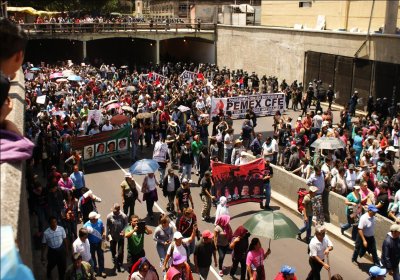After the storm, the “shock doctrine”. This is what awaits the Philippines after the devastation wrought by Typhoon Haiyan.
The familiar cycle of “disaster capitalism” allows wealthy and politically connected First World corporations to profit obscenely from the suffering of acutely vulnerable disaster-affected communities.
Disaster profiteering is a parasitic tendency deeply embedded in the structures of the neoliberal global economy. It will degrade and corrupt the international “relief effort” under way in the Philippines.
David T. Rowlands
The Peruvian government has renewed its commitment to several controversial mining mega-projects. The projects have provoked huge regional protests against the environmentally destructive expansion plans of foreign mining corporations.
Speaking at a mining industry conference held in the southern city of Arequipa on September 16, Minister of Energy and Mines Jorge Merino indicated that Conga (in Cajamarca), Tia Maria (in Arequipa) and Corani (in Puno) will be developed with the backing of President Ollanta Humala's administration.
Striking Mexican teachers from a dissident union leading popular resistance to the government’s neoliberal reform agenda in recent weeks.
Despite enduring relentless media hostility, the teachers' strike is now starting to broadened out to merge with protests against plans to hand over key national assets, such as Mexico’s state-owned oil industry, to the profit-hungry multinationals.
The proposed fate of Istanbul’s Gezi Park has much in common with the current re-development plans for Barangaroo in Sydney’s East Darling Harbour. Sydneysiders concerned about the Crown/Lend Lease takeover bid can draw inspiration from the Gezi Park occupiers and send a clear message of defiance to James Packer’s fawning peons in the Barry O’Farrell government.
All over the world, the privatisation of public space is growing. As Anna Minton, leading policy analyst and author of Ground Control, has pointed out in connection with the situation in Britain.
In the aftermath of the April 24 Rana Plaza collapse, the plight of Bangladeshi garment workers occupied global media attention in a way it never had before.
The inconvenient thing about Rana Plaza, as far as the fashion brands that rely on outsourced sweatshop labour were concerned, was that so many workers — more than 1100 — died in one spectacular incident.
The Conga gold and copper mining project is becoming one of Latin America’s most significant environmental battlefronts. It is pitting almost the entire population of the northern Cajamarca region of Peru against the invasive forces of the multinational mining industry and its governmental puppets in Lima.
In recent years, there have been many strikes and protests. This has led to hundreds of arrests, scores of injuries and several protester deaths.
Nearly 60 years have passed since Totem 1, a British nuclear test in the Australian desert, was recklessly conducted in unfavourable meteorological conditions.
Nuclear testing of any sort, even in the most “controlled” of circumstances, is inherently abusive, a crime against the environment and humanity for countless generations to come. Yet the effects of Totem 1 were particularly bad, even by the warped standards of the era.
Hundreds of protesters from the indigenous advocacy NGO Survival International gathered outside Peruvian consulates and embassies in London, Paris, Madrid and San Francisco on April 23. They had gathered to urge the Peruvian government to reconsider expanding the Camisea gas mega-project.
Camisea’s Bloc 88, deep in the Amazonian jungles of south-eastern Peru, is thought to contain over 10 trillion cubic feet of gas.
The truth about Anzac Day is that it is as much about denial as it is about remembrance. It is a denial that functions for both sides of the original conflict.
Chinese leaders are aware that visiting Western leaders will be under some pressure from their domestic constituencies to raise Tibet, human rights and other “sensitive” issues.
So a mechanism has been considerately created to cater for this need. It consists of a meaningless piece of theatre otherwise known as the “obligatory-behind-closed-doors-human-rights-discussion”.
According to the well-worn script, the elected foreign official heads to China on a trade mission, accompanied by a media circus and some high-level trough-snouting capitalists (like Andrew Forrest).
In a move that shows how little has changed since Ernesto “Che” Guevara famously observed the maltreatment of Chile’s copper miners by foreign capitalists in The Motorcycle Diaries, more than 500 mineworkers have been summarily sacked by the Anglo-Australian mining giant BHP Billiton.
Their offence was to participate in strike action for improved pay and conditions at Escondida, an open-cut mine located in the arid Antofagasta region of northern Chile.
Chile may have dispensed with military dictatorship, but agitating for workers’ rights can still get you assassinated.
Juan Pablo Jimenez, 35, was the president of the union representing workers at Azeta, one of Chile’s largest electrical engineering companies. On February 21, he was found dead in a pool of blood at his workplace, minutes after finishing a shift, a bullet lodged in his cranium.
The initial police report said it was a “bala loca” that killed Jimenez — a random stray bullet that supposedly made its way into Jimenez’s enclosed workshop.
- Previous page
- Page 2
- Next page




